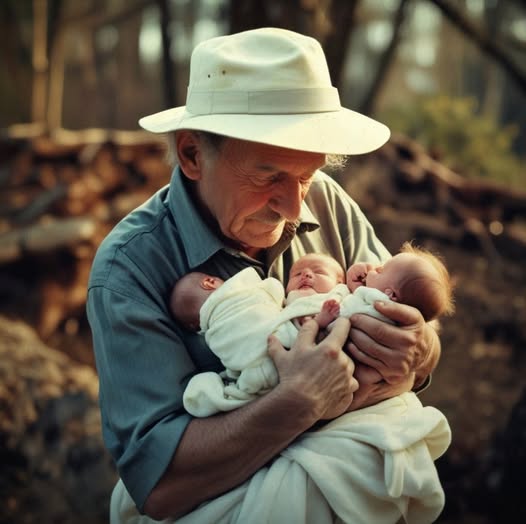The Forgotten Cries Beneath the Pines
The morning mist clung low to the earth, like a memory refusing to fade. In the heart of the valley, where the forest met the worn edges of a tired old farm, seventy-year-old Eli Warren trudged through the dew-drenched grass. His boots sank slightly into the soil softened by spring rain, and beside him padded his loyal companion, Rusty, a wiry, aging mutt with eyes still bright with curiosity.
Eli had lived alone since his wife passed, spending his days tending the land they had built together. The world had grown quiet around him in recent years, but the silence brought no peace—only echoing reminders of what once was.
That particular morning, something felt different. Rusty, usually content to sniff along the trail and chase the occasional rabbit, suddenly froze mid-step, ears perked, his body tense. Then, without warning, he bolted toward the cluster of pine trees near the edge of the property.
— What is it, boy? — Eli called after him, his voice raspy and concerned.
He followed as quickly as his old knees allowed, weaving through the trees until he heard it—a soft, tremulous cry. Then another. Eli’s breath caught as he pushed aside a veil of branches, revealing a sight that rooted him to the ground.
Three infants.
They lay nestled in a crude nest of dry leaves and cloth, their tiny bodies wrapped in thin, fraying blankets. One stirred weakly, a quiver passing through her limbs. The others whimpered, eyes barely open. The air around them was cold and still, and Eli felt the chill seep into his bones—not from the wind, but from the impossible reality before him.
— Sweet Lord… — he whispered.
Kneeling slowly, Eli reached out, afraid to touch them, afraid they might vanish like a dream. But they were real—frighteningly so. Two girls and a boy. Too small to speak, but their eyes spoke volumes. Fear. Cold. Need.
As he gathered them into his arms, he noticed something strange: each child wore a thin silver necklace. One bore a charm shaped like a crescent moon, another a tiny sun, and the last a star. They glinted faintly in the dim light.
And then—silence.
As soon as he held them close, their cries ceased. The three tiny souls quieted together, as if drawn into the gravity of something unspoken. Eli’s heart, which had long grown used to loneliness, beat with a sudden sense of urgency. Purpose.
He hurried back to the farmhouse, clutching them tightly, whispering to Rusty to stay close. Once inside, he stoked the old wood stove to life and laid the babies near the warmth. He used every spare blanket he could find, his hands trembling as he worked. He hadn’t cared for a baby in decades—but instinct kicked in.
He warmed canned milk and spoon-fed it, drop by drop, into their eager mouths. His heart ached at the sight of their hunger, at the realization that someone had left them to fate. Who would do such a thing? And why here, to him, of all people?
Later, while changing one of the blankets, a folded scrap of paper slipped out. It was worn and smudged, but the words were clear:
“Please love them more than I can. I’m sorry.”
Eli stared at the note for a long while, his rough fingers tracing the lines. It wasn’t abandonment, he realized—it was surrender. Whoever had left them hadn’t done so out of cruelty, but despair. And perhaps… hope.
He called an old friend—Lena, a retired nurse from town. When she arrived and saw the scene, her eyes softened. She examined the babies, cleaned them, helped Eli make proper formula. As she worked, he asked the question that gnawed at him.
— What do we do now?
Lena looked at him, thoughtful.
— We keep them safe. We figure it out together. You saved their lives, Eli. That matters more than anything right now.
Word spread fast in their small mountain town. Neighbors brought diapers, bottles, soft clothes. They came not out of pity, but respect—for Eli, and for the mysterious little trio who had somehow captured everyone’s heart.
No one knew where they had come from. No parents were found. The initials “L” etched into the backs of their silver charms remained the only clue—each one marked with a letter, but not a name.
Weeks passed. The babies began to thrive. Eli named them for what they gave him: Hope, Joy, and Ray. And slowly, the house that had grown cold and quiet filled with the sweet, chaotic sounds of new life. Rusty took to guarding their crib like a soldier, and Eli found himself laughing again—sometimes softly, sometimes with tears in his eyes.
One morning, a letter arrived in the mailbox. No return address. Just his name on the front, in delicate handwriting.
Inside, a short message:
“They are all I had left. I couldn’t give them what they deserved. But I chose your land because I believed you still had love to give.”
Eli folded the letter and placed it in a drawer beside the note from the blanket. He never told anyone about it—not even Lena. Some things were meant to be held close, to live quietly in the heart.
Over time, the children became the village’s joy. And Eli, once just an old man on a forgotten farm, became something much more: a guardian, a grandfather, a symbol of hope.
Years later, when the children asked about the charms they still wore, Eli would smile and say,
— They’re reminders that you were meant to find each other. And that I was meant to find you.
Because sometimes, life places miracles at your feet. And if you’re brave enough to pick them up—to choose love in a moment of uncertainty—you might just find that your own story isn’t over after all. In fact, it may be just beginning.
